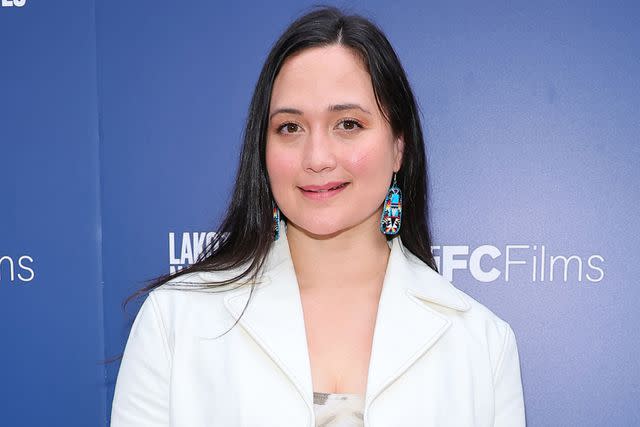“Killers of the Flower Moon” star Lily Gladstone uses she/they pronouns to 'decolonize gender'
- Oops!Something went wrong.Please try again later.
The actor remembers thinking “everybody should just be they” from a young age.
Lily Gladstone uses she/they pronouns, and says that they represent a way of resisting colonial structures.
“My pronoun use is partly a way of decolonizing gender for myself,” the Killers of the Flower Moon actor told PEOPLE, adding that using she/they pronouns is also a means of “embracing that when I'm in a group of ladies, I know that I'm a little bit different. When I'm in a group of men, I don't feel like a man. I don't feel [masculine] at all. I feel probably more feminine when I'm around other men.”
Gladstone also explained how her gender identity reflects their Indigenous heritage. “In most Native languages, most Indigenous languages, Blackfeet included, there are no gendered pronouns. There is no he/she, there's only they,” the actor explained. Gladstone has both Blackfeet and Nimiipuu heritage, and grew up on a Blackfeet reservation in Montana.

Gladstone’s nuanced relationship with gender began at a young age. “I remember being 9 years old and just being a little disheartened, seeing how often a lot of my boy cousins were misgendered because they wore their hair long,” they said. “It happens to a lot of kids, I think, especially Native boys leaving a community where long hair is celebrated [and then] just kind of getting teased for it…So I remember back then being like, everybody should just be they.”
“It doesn't happen as much anymore, but there've been several times in my life where I've been speaking to a northern Cheyenne-first language speaker [or another] Indigenous-first language speaker where they'll accidentally misgender you when they're talking to you,” Gladstone continued. “And then they'll get embarrassed about it, but it's because they've learned English later.”
Gladstone says that the complexity of many Indigenous languages means that there aren’t gendered pronouns. “So Blackfeet, we don't have gendered pronouns, but our gender is implied in our name. But even that's not binary,” they explained. For example, Gladstone’s grandfather’s Blackfeet name meant “Iron Woman.” “He had a name that had a woman's name in it. I'd never met my grandfather. I wouldn't say that he was nonbinary in gender, but he was given a woman's name because he kind of carried himself, I guess, the way that women who have that name do.”
Gladstone also acknowledged the pros and cons of awards shows giving gendered awards to performers. “I do feel that historically having gendered categories has helped from keeping women actors from a lot of erasure because I think historically people just tend to honor male performances more,” she said. “I don't know, maybe it’s just an overly semantic thing where I'm like, if there's not a 'director-ess,' then there shouldn't be actresses. There's no 'producer-ess,' there's no 'cinematographer-ess.’”
Want more movie news? Sign up for Entertainment Weekly's free newsletter to get the latest trailers, celebrity interviews, film reviews, and more.
Related content:
Lily Gladstone and Leonardo DiCaprio on the 'grand betrayal' of Killers of the Flower Moon
Lily Gladstone remembers childhood obsession with Leonardo DiCaprio in Titanic
How Osage influence brought Killers of the Flower Moon to life
Read the original article on Entertainment Weekly.

